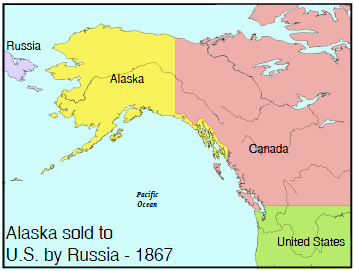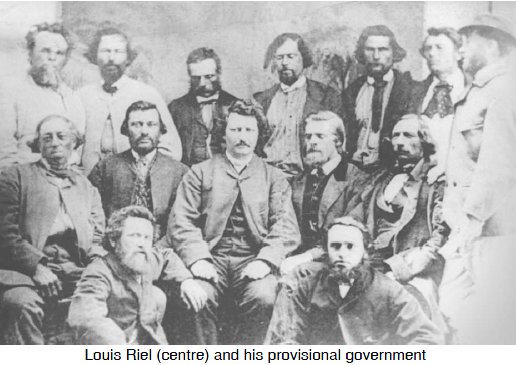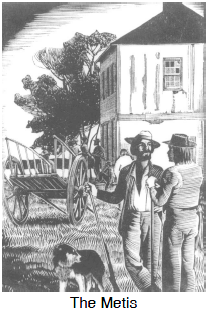The day after Queen Victoria signed the British North America Act creating the Dominion of Canada in 1867, the United States purchased Alaska from Russia.  At the same time, new states were rapidly being created in the American northwest and some American politicians and journalists were proudly bragging that it would only be a matter of time before Manifest Destiny would give their country control over the whole of North America.
At the same time, new states were rapidly being created in the American northwest and some American politicians and journalists were proudly bragging that it would only be a matter of time before Manifest Destiny would give their country control over the whole of North America.
Although Canada's founders had visions of a nation which would eventually unite the British territories and colonies from sea to sea, these expansionist threats from the United States gave greater urgency to their plans. They began negotiating with the Hudson's Bay Company to buy much of Rupert's Land and started encouraging settlers to move west. Unfortunately, they failed to discuss any of these plans with the 10,000 Métis who already lived in the Red River Valley. Naturally the Métis feared the loss of their traditional hunting grounds, their nomadic way of life and the French and Roman Catholic parts of their culture.
Led by a passionate and articulate leader, Louis Riel, they seized Fort Garry, set up a provisional government and managed to persuade Sir John A. Macdonald to agree to a List of Rights which they hoped would protect their lands and traditions just as the Quebec Act had created constitutional protections for the French-Canadian culture. The result was the Manitoba Act of 1870 which added a fifth province to the Canadian federation.

This did not extinguish, however, the strong emotions which had been aroused in the rest of Canada by the controversy over Métis lands.  The rebellion and its consequences had brought out the worst racial biases of some political leaders, stirred sympathy in Quebec for their fellow French Catholics, and raised the hackles of the Orangemen of Ontario whose anti-French, anti-Catholic feelings were fuelled by the execution of Ontario-born Thomas Scott. Ontario also had designs on the rich farming lands of the prairies which some felt should be part of its territory. It was not an issue which would rest for long.
The rebellion and its consequences had brought out the worst racial biases of some political leaders, stirred sympathy in Quebec for their fellow French Catholics, and raised the hackles of the Orangemen of Ontario whose anti-French, anti-Catholic feelings were fuelled by the execution of Ontario-born Thomas Scott. Ontario also had designs on the rich farming lands of the prairies which some felt should be part of its territory. It was not an issue which would rest for long.
